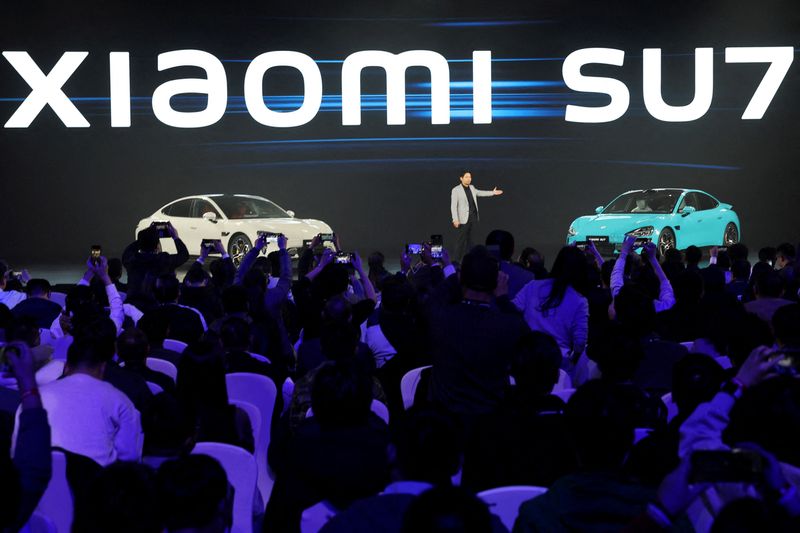By Sarah Wu
BEIJING (Reuters) -He was called China's answer to Steve Jobs for taking Xiaomi from scrappy startup to an electronics giant known for its smartphones.
With the launch of a much-hyped and against-the-odds electric car, Lei Jun, Xiaomi's co-founder and CEO, is taking on Elon Musk with a strategy that takes a page from Tesla's playbook.
Lei, 54, took the stage in Beijing on Thursday to unveil Xiaomi's SU7 car, a project three years in the making that has attracted a lot of attention but which, Lei has warned investors, will lose money.
During Thursday's two-hour event - a livestream millions of Chinese tuned in to watch - Lei made a jibe at Apple (NASDAQ:AAPL) for dropping its car project and declared Xiaomi's EV superior to Tesla's Model 3.
Fans dubbed the Xiaomi CEO "Thor" on social media, a play on his surname which means thunder in Chinese. Some commented that his outfit - a grey blazer over a black t-shirt - looked like something Musk would wear.
Already a household name in China, Lei's marketing strategy for his EV borrows directly from Musk, said Yale Zhang, managing director at Automotive Foresight.
"One person equals an entire marketing team," Zhang said. "With every word he says, the attention he attracts online is of a different magnitude."
Born in central China, Lei graduated from Wuhan University with a degree in computer science before working his way up to become chief executive of software firm Kingsoft.
In 2010, he co-founded Xiaomi. By 2014, the tech startup had a valuation of $46 billion.
The Beiijng-based company has grown with the popularity of its smartphones and home appliances, beloved in Chinese households for their affordability and sleek styling.
Last year, Xiaomi launched more expensive smartphones to compete with Apple's iPhone, but Lei's decision to sell a sporty EV that draws styling cues from Porsche (ETR:P911_p) will test the Chinese company's ability to shift to a new, premium market.
In 2021, Lei announced Xiaomi would build its own EV, an undertaking he said then would be "the last major entrepreneurship project" of his life.
"In the three years of developing this car, my biggest realization is that making cars is extremely difficult,” Lei said on Thursday. "Even a giant like Apple gave up on it."
BEIJING BACKING
The SU7 - short for Speed Ultra 7 - enters a crowded China EV market with an attention-grabbing price tag, under $30,000 for the base model, cheaper than Tesla's Model 3 in China.
Xiaomi built a Beijing factory capable of producing 200,000 cars annually before it had regulatory approval to start manufacturing in China. State-owned automaker BAIC Group disclosed in November it would make the cars for Xiaomi - at the same Xiaomi plant.
Xiaomi, which plans to sell the SU7 only in China for now, did not immediately respond to a request for comment.
Lei said without the support of the Beijing authorities, it would have been "impossible" to complete the car in three years, according to a transcript posted by auto blogger Chang Yan, who was among a group of Chinese reporters invited to interview Lei on Thursday.
Musk also won support from the Shanghai government when setting up the Tesla factory there. The construction of Tesla's Shanghai plant took less than a year after it broke ground in 2019.
Analysts remain split on whether Lei's project will go beyond creating buzz to make money in a hyper-competitive EV market. "The risk is that they focus too much on the EV space and lose focus on the sectors and products that got them there,” said Tu Le, founder of consultancy Sino Auto Insights.
Lei said he had originally planned to sell the high-end version of the SU7 for around $48,500 before cutting that to about $41,500 as other automakers slashed prices.
"Xiaomi has enough cash reserves to cope with any fierce competition in the next five years. And if it is possible, Xiaomi will look for ways to accumulate more cash," Lei said.

Xiaomi said it had received 50,000 orders in the first 27 minutes of the SU7 going on sale. On Friday, it said that figure hit 88,898 in 24 hours.
($1 = 7.2277 Chinese yuan renminbi)